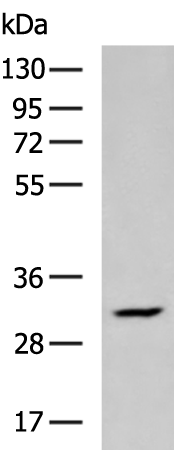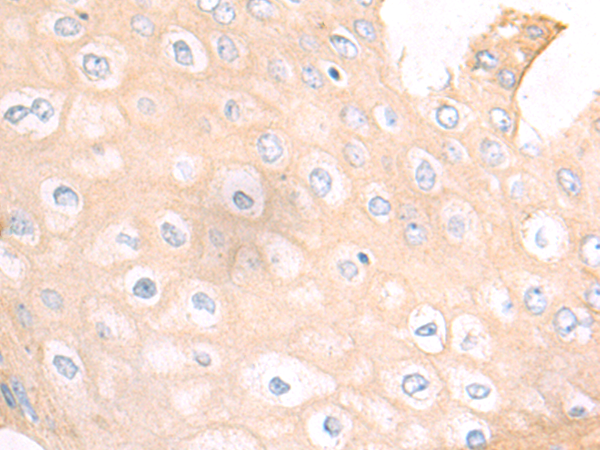

| WB | 咨询技术 | Human,Mouse,Rat |
| IF | 咨询技术 | Human,Mouse,Rat |
| IHC | 1/50-1/200 | Human,Mouse,Rat |
| ICC | 技术咨询 | Human,Mouse,Rat |
| FCM | 咨询技术 | Human,Mouse,Rat |
| Elisa | 1/5000-1/10000 | Human,Mouse,Rat |
| Aliases | PRO232 |
| WB Predicted band size | 12 kDa |
| Host/Isotype | Rabbit IgG |
| Antibody Type | Primary antibody |
| Storage | Store at 4°C short term. Aliquot and store at -20°C long term. Avoid freeze/thaw cycles. |
| Species Reactivity | Human, Mouse |
| Immunogen | Synthetic peptide of human PSCA |
| Formulation | Purified antibody in PBS with 0.05% sodium azide and 50% glycerol. |
+ +
以下是关于PSCA抗体的3篇参考文献及其摘要概括:
---
1. **文献名称**:*Prostate stem cell antigen: a cell surface marker overexpressed in prostate cancer*
**作者**:Reiter RE, et al.
**摘要**:该研究首次克隆并鉴定了PSCA(前列腺干细胞抗原)作为前列腺癌特异性过表达的细胞表面糖蛋白,证实其通过单克隆抗体靶向抑制肿瘤生长,为前列腺癌免疫治疗奠定基础。
---
2. **文献名称**:*Therapeutic efficacy of anti-PSCA antibody-drug conjugate in solid tumors*
**作者**:Wente MN, et al.
**摘要**:研究开发了一种靶向PSCA的抗体-药物偶联物(ADC),在胰腺癌和膀胱癌模型中显示出显著抗肿瘤活性,表明PSCA抗体在实体瘤靶向治疗中的潜在临床应用价值。
---
3. **文献名称**:*PSCA as a biomarker for circulating tumor cells in metastatic prostate cancer*
**作者**:Saffran DC, et al.
**摘要**:通过PSCA特异性抗体检测血液中循环肿瘤细胞(CTC),证实其在前列腺癌转移监测中的高灵敏度和特异性,提出PSCA抗体在液体活检中的诊断工具潜力。
---
注:以上文献为领域内代表性研究,涵盖PSCA抗体的基础机制、治疗开发及诊断应用方向。如需具体年份或期刊信息可进一步补充。
Prostate Stem Cell Antigen (PSCA) is a cell surface glycoprotein belonging to the Ly-6/Thy-1 family, anchored by glycosylphosphatidylinositol (GPI). First identified in prostate cancer, PSCA is overexpressed in multiple malignancies, including bladder, pancreatic, gastric, and ovarian cancers, while exhibiting limited expression in normal tissues (e.g., prostate basal cells, bladder urothelium). This tumor-restricted expression profile makes PSCA an attractive therapeutic target.
PSCA promotes tumor progression through mechanisms involving cell proliferation, survival, and immune evasion. Its overexpression correlates with advanced disease stages and poor prognosis in several cancers. Since the early 2000s, PSCA has been investigated as a target for antibody-based therapies. Monoclonal antibodies against PSCA have shown preclinical efficacy in blocking signaling pathways and mediating antibody-dependent cellular cytotoxicity (ADCC).
Clinical development includes PSCA-targeted therapies such as antibody-drug conjugates (ADCs), bispecific antibodies, and CAR-T cells. Challenges remain due to tumor heterogeneity and on-target/off-tumor toxicity risks in PSCA-low normal tissues. Ongoing research focuses on optimizing antibody specificity, combination therapies, and biomarker strategies to enhance therapeutic efficacy. PSCA continues to be a promising candidate for precision oncology approaches.
×